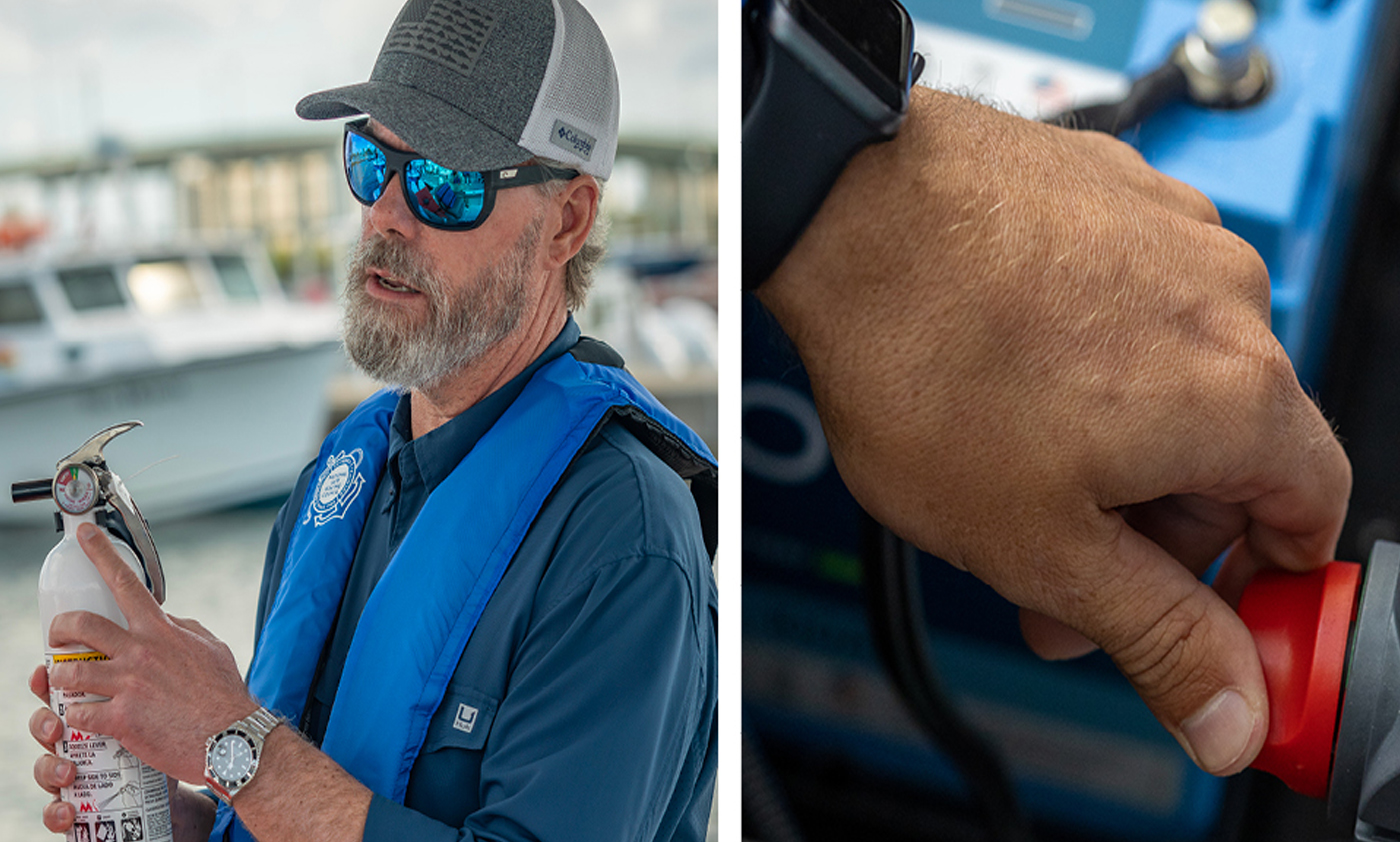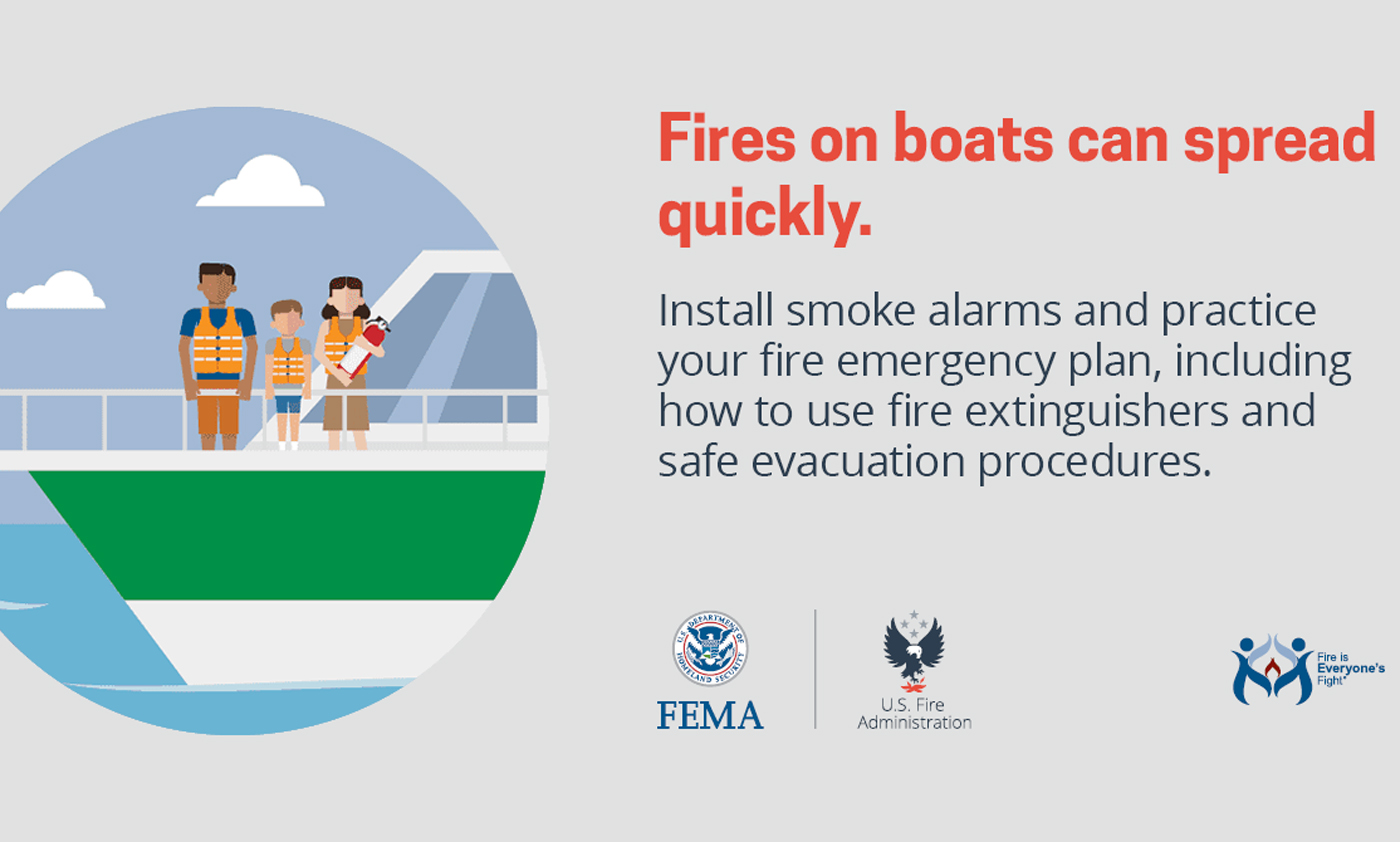With cooler temperatures arriving and boating season winding down, that can only mean one thing – winter is here. Whether you’re fortunate enough to boat year-round or you store your boat, there are several precautions you can take to minimize the risk of starting a fire. Fire safety and prevention are heavily discussed within the walls of your home, but how does that translate into the marine environment? No matter if you’re renting a vessel, storing your boat, or prepping for the next outing on the water – these key tips are crucial to preventing fires and staying safe in any fire emergency.
Know before you go
Being a responsible boat owner or renter, means familiarizing yourself with all boating safety regulations. The knowledge you build before you ever leave the comfort of your home is vital to your safety and those around you. It’s recommended to take an approved boating safety course, which are often required by state law, that discusses in-depth fire safety protocols.
A recent boat ramp encounter with a Marine Patrol Deputy performing a routine vessel safety check, served as a helpful reminder to check all regulations frequently before hitting the water. Things you want to familiarize yourself with and constantly check for updates include:
• All boating safety regulations
• Fire extinguisher requirements
• Fire extinguisher expiration dates (expire 12 years from manufacturing date)
• Any notable recalls affecting your units
Going a step further by scheduling a free vessel safety check with the U.S. Coast Guard Auxiliary, will provide a thorough check of your fuel system, visible electrical systems, battery compartment, and verify your fire extinguisher meets U.S.C.G. requirements specific to your vessel. This gives the boat operator time to safely correct any potential hazards before operating the vessel on the water.

Where can fires start and how do we prevent them?
Fires can start in a variety of places, often being caused by fuel or electrical systems. According to the U.S. Fire Administration “fires that occur on boats or in marinas can spread quickly and present unique response challenges due to hazardous conditions and limited access”. Having the proper knowledge and safety protocols in place are the keys to successfully preventing fires from starting.
Several ways fires can start in a marine environment can include, but are not
limited to:
According to the 2023 United States Coast Guard Recreational Boating Statistics Report, 117 accidents were caused by fire/ explosion related to fuel and resulting in $4,035,964.23 in damages. Simple prevention like cleaning up fuel spills, using caution when fueling your boat, and releasing fuel vapors from boat compartments can help minimize the risk of fires.
Know your equipment and how to maintain it
Electrical systems and marine wiring are complex systems that require attention to detail and constant routine maintenance. Inspecting all electrical components, batteries, battery chargers, wiring, and electronics frequently can help minimize the risk of ignition. Make sure to refer to all Owner’s manuals on components like battery chargers to make sure they are being operated within their intended use and not being overloaded.
All vessels with permanently installed fuel tanks or spaces capable of trapping fumes are required by law to have a valid, working fire extinguisher capable of servicing that size vessel. It’s always a good idea to carry a fire extinguisher. Please refer to the United States Coast Guard fire extinguisher laws specific to the length of your vessel to determine the fire extinguisher suitable and required to be carried on board at all times.
Please be mindful that your fire extinguisher is in proper working order by checking the compression levels at the top of the bottle. The indicator will show green, if the unit is properly armed. If the unit is showing red in the indicator window, please dispose of the unit properly. Disposing of fire extinguishers should not be placed in household trash or recycling, please contact your local hazardous waste department to discuss proper disposal options.

A fire has started, what now?
Prevention is the key to eliminating risks of a fire, but what happens if a fire ignites unexpectedly? Before ever leaving the dock, the captain should discuss a fire emergency plan with all passengers on board and practice it in the event of an emergency. If your boat is stored in a Marina, be aware of the Marina’s fire protocols and the suppression systems they have in place. Fires should always be handled by trained professionals; however, you may find yourself needing to act in an emergency. A good common practice to remember is:
Please be mindful that fire extinguishers have small capacities and are meant to extinguish a small fire. If a fire is large, and spreading, please call 9-1-1 immediately and evacuate the vessel urgently. Fires on a vessel are extremely dangerous and can intensify rapidly.
Whether you’re enjoying the cooler temperatures from the boat this upcoming weekend, or your boating season has coming to an end, use these tips to practice successful fire safety and build the confidence to make smart decisions in any fire situation. The best fire safety method is prevention.
Please refer to the United States Coast Guard’s recreational boater fire extinguisher requirements FAQ, the U.S. Fire Administration, your local fire department, or closest U.S. Coast Guard Auxiliary for any additional information. Stay safe and happy boating!
Back to Blue Life
Know before you go
Being a responsible boat owner or renter, means familiarizing yourself with all boating safety regulations. The knowledge you build before you ever leave the comfort of your home is vital to your safety and those around you. It’s recommended to take an approved boating safety course, which are often required by state law, that discusses in-depth fire safety protocols.
A recent boat ramp encounter with a Marine Patrol Deputy performing a routine vessel safety check, served as a helpful reminder to check all regulations frequently before hitting the water. Things you want to familiarize yourself with and constantly check for updates include:
• All boating safety regulations
• Fire extinguisher requirements
• Fire extinguisher expiration dates (expire 12 years from manufacturing date)
• Any notable recalls affecting your units
Going a step further by scheduling a free vessel safety check with the U.S. Coast Guard Auxiliary, will provide a thorough check of your fuel system, visible electrical systems, battery compartment, and verify your fire extinguisher meets U.S.C.G. requirements specific to your vessel. This gives the boat operator time to safely correct any potential hazards before operating the vessel on the water.

Where can fires start and how do we prevent them?
Fires can start in a variety of places, often being caused by fuel or electrical systems. According to the U.S. Fire Administration “fires that occur on boats or in marinas can spread quickly and present unique response challenges due to hazardous conditions and limited access”. Having the proper knowledge and safety protocols in place are the keys to successfully preventing fires from starting.
Several ways fires can start in a marine environment can include, but are not
limited to:
- Fuel spills and trapped fuel vapors
- Battery chargers and battery failures
- Wiring and electrical systems
- Smoking in marinas
According to the 2023 United States Coast Guard Recreational Boating Statistics Report, 117 accidents were caused by fire/ explosion related to fuel and resulting in $4,035,964.23 in damages. Simple prevention like cleaning up fuel spills, using caution when fueling your boat, and releasing fuel vapors from boat compartments can help minimize the risk of fires.
Know your equipment and how to maintain it
Electrical systems and marine wiring are complex systems that require attention to detail and constant routine maintenance. Inspecting all electrical components, batteries, battery chargers, wiring, and electronics frequently can help minimize the risk of ignition. Make sure to refer to all Owner’s manuals on components like battery chargers to make sure they are being operated within their intended use and not being overloaded.
All vessels with permanently installed fuel tanks or spaces capable of trapping fumes are required by law to have a valid, working fire extinguisher capable of servicing that size vessel. It’s always a good idea to carry a fire extinguisher. Please refer to the United States Coast Guard fire extinguisher laws specific to the length of your vessel to determine the fire extinguisher suitable and required to be carried on board at all times.
Please be mindful that your fire extinguisher is in proper working order by checking the compression levels at the top of the bottle. The indicator will show green, if the unit is properly armed. If the unit is showing red in the indicator window, please dispose of the unit properly. Disposing of fire extinguishers should not be placed in household trash or recycling, please contact your local hazardous waste department to discuss proper disposal options.

A fire has started, what now?
Prevention is the key to eliminating risks of a fire, but what happens if a fire ignites unexpectedly? Before ever leaving the dock, the captain should discuss a fire emergency plan with all passengers on board and practice it in the event of an emergency. If your boat is stored in a Marina, be aware of the Marina’s fire protocols and the suppression systems they have in place. Fires should always be handled by trained professionals; however, you may find yourself needing to act in an emergency. A good common practice to remember is:
- Find the fire.
- Restrict the fire.
- Extinguish the fire.
Please be mindful that fire extinguishers have small capacities and are meant to extinguish a small fire. If a fire is large, and spreading, please call 9-1-1 immediately and evacuate the vessel urgently. Fires on a vessel are extremely dangerous and can intensify rapidly.
Whether you’re enjoying the cooler temperatures from the boat this upcoming weekend, or your boating season has coming to an end, use these tips to practice successful fire safety and build the confidence to make smart decisions in any fire situation. The best fire safety method is prevention.
Please refer to the United States Coast Guard’s recreational boater fire extinguisher requirements FAQ, the U.S. Fire Administration, your local fire department, or closest U.S. Coast Guard Auxiliary for any additional information. Stay safe and happy boating!
